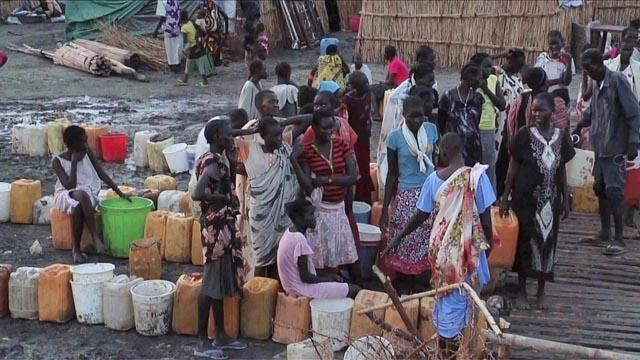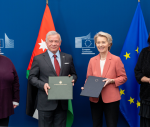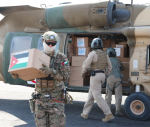You are here
Scenes of death in South Sudan: ‘No humanity here’
By AP - Feb 27,2014 - Last updated at Feb 27,2014
MALAKAL, South Sudan — House after house has been burned to the ground. Hospital patients have been shot by armed rebels while lying in their beds. Dozens of corpses litter the streets.
“This is about revenge now. There is no humanity here,” said Col. Jan Hoff, an officer in Norway’s army who has served in Afghanistan, Iraq and Syria.
South Sudan, he said, is the worst he’s seen.
“It’s absolutely horrific,” Hoff said this week as he led a heavily armed UN convoy through the streets of Malakal, the capital of oil-producing Upper Nile state. “This is tribe against tribe. In Syria it was foreign fighters against the government. Here I don’t think it’s about the government.”
A corpse nearby is already a skeleton wrapped in a soldier’s uniform. Hoff said he counted 30 bodies on a recent day. A colleague had counted 70. The dead include both civilians and soldiers.
Human Rights Watch said Thursday that both government and rebel forces are responsible for serious abuses that may amount to war crimes for atrocities committed in Malakal and Bentiu, another capital of an oil-producing state, despite a ceasefire signed in January. Reprisal killings, based on ethnicity, are common place.
“Armed forces from both sides have extensively looted and destroyed civilian property, including desperately needed aid facilities, targeted civilians, and carried out extrajudicial executions, often based on ethnicity,” said Human Rights Watch, which called the destruction and violence against civilians “shocking”.
A week ago forces loyal to former vice president Riek Machar retook Malakal in a bloody assault that forced the government army to make what it labelled a tactical withdrawal.
Government officials this week said they would retake the town, but on Wednesday, as the UN convoy drove through, there was no sign of South Sudan’s army. The only talk was how rebels were pushing north towards the oil fields that provide the world’s newest nation it’s only income.
After the UN personnel alighted from their vehicles to tour the Malakal hospital, the smell of death and sight of destruction overwhelmed. The hospital, now filled with heavily armed rebel soldiers, is ransacked and empty of patients. Inside is a scattering of dead bodies, including those clearly executed in their beds. Flies are everywhere.
The UN has classified South Sudan as a Level 3 emergency that puts it on par with Syria’s crisis. As South Sudan’s rainy season approaches there are fears that the hundreds of thousands displaced by fighting will not be able to plant crops, an event that the UN aid chief here says could precipitate a famine.
Church leaders, analysts and government leaders have played down the ethnic dimension to the conflict, but more often than not the violence is being carried out by one ethnic group against another.
Human Rights Watch said that despite the ceasefire both rebels and government have launched attacks, and that credible reports indicate government forces supported by Uganda’s military have attacked locations in Unity state. The group said it has credible reports that rebel fighters killed civilians at the Malakal hospital, where Doctors Without Borders on Wednesday said it found 14 dead bodies.
“A clear pattern of reprisal killings based on ethnicity, massive destruction, and widespread looting has emerged in this conflict,” Human Rights Watch said.
At Christ is King Malakal Catholic Church, where three white UN tanks guard people — mainly from a group called Shilluks — Ko Aduk Peter said no one is safe regardless of tribe.
“Yesterday some soldiers took our girls by power. Six women, about 20 years, from the church,” he said. “Now we don’t know where they are.”
Toby Lanzer, the UN’s humanitarian coordinator in South Sudan, who travelled to Malakal on Wednesday, said the town is in a “terrible state that was really quite shocking”.
The UN camp in Malakal has hosted up to 20,000 people since fighting broke out in December. Ethnic conflict broke out inside the camp at one point, resulting in the deaths of 10 people.
While Lanzer was promoting peace talks, the UN has been preparing for more fighting in the north, near South Sudan’s oil fields.
“The conflict in South Sudan is far from over, with civilians still at risk of further abuse even inside UN compounds,” said Daniel Bekele, Africa director at Human Rights Watch. “Military commanders from both sides have an obligation to immediately and unequivocally order their forces to stop attacking civilians and civilian property, and the commanders need to hold abusive soldiers to account.”
Related Articles
At least 200 South Sudanese civilians have drowned in a ferry accident on the White Nile river while fleeing fresh fighting in the city of Malakal, an army spokesman said Tuesday.
South Sudan’s president said his soldiers had seized the regional capital Malakal back from rebels on Monday, a report dismissed by insurgents battling in the world’s newest country.
The White House has expressed horror at what it called the “abomination” of spiralling violence in South Sudan’s civil war, where rebels have been accused of massacring hundreds of civilians.

















